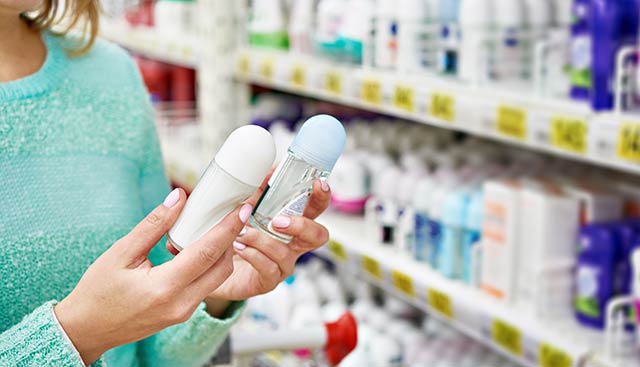
Should I Be Worried About Wearing Deodorant?
Studies show that breast cancer most often develops in the upper outer quarter of a breast, which is the area closest to the armpit – where deodorant is normally applied. This has led some people to wonder if there is a connection between breast cancer and the use of deodorant products.
It’s important to understand that breast tissue isn’t spread equally over the four quadrants that make up a breast; of the four, the upper outer quadrant has the most breast tissue. When you consider the amount of breast tissue in this area, the proportion of cancers that develop there makes sense. Nevertheless, some researchers suggest that an increase in the use of antiperspirants correlates to a rise in the incidence of breast cancer.
What is known about the ingredients in deodorants?
Even though many people use the terms "antiperspirant" and "deodorant" interchangeably, antiperspirants are actually a subset of deodorants, and each works in a different way. Along with sweat, the sweat glands under the arms expel fats and proteins. As bacteria feast on those fats and proteins, they produce odorous byproducts. While deodorants are simply designed to mask the resulting smell, antiperspirants can prevent the production of sweat in the first place.
The active ingredient in most antiperspirants is aluminum, which blocks the sweat glands in order to inhibit perspiration. Additionally, some antiperspirants – and deodorants – contain parabens which are used widely as preservatives in cosmetic and pharmaceutical products, and even as food additives, primarily for their bactericidal and fungicidal properties. Both aluminum and parabens are potential endocrine disruptors, which means they have potential to mimic estrogen and interfere with the body’s hormone levels at least in laboratory (non-human) studies.
Most concerns about deodorants and antiperspirants are based on a theory that pores in the skin under the arms can become clogged with aluminum or parabens, which can increase the level of estrogen in the body, either from the compounds themselves or from hormones in the skin that can’t escape through sweat. However, animal experiments show that parabens have at-most weak estrogenic activity and epidemiological studies do not support a link between antiperspirant use and breast cancer in women. Furthermore, the U.S. Food and Drug Administration (FDA), which regulates food, cosmetics, medicines and medical devices, has no evidence or research data that ingredients in underarm antiperspirants or deodorants cause cancer.
If you’d like to discuss your breast cancer risk factors with an oncologist in the Don & Erika Wallace Comprehensive Breast Program at Moffitt Cancer Center, you can request an appointment with or without a referral. Call 1-888-663-3488 or complete our new patient registration form online.
